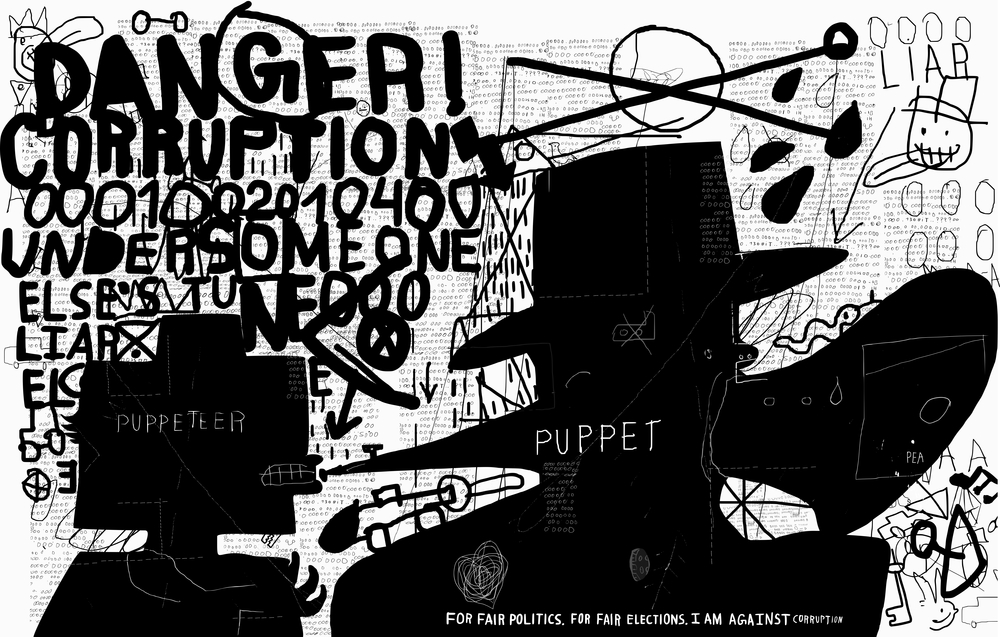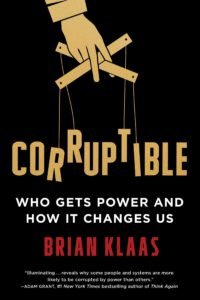Can We Pick Better Leaders?
By Arnold Kling


- In an ideal alternate reality… only the good people—let’s refer to them for simplicity as incorruptibles—would be our leaders, our bosses, our police officers. Meanwhile, the people you wouldn’t want to have in charge—let’s call them corruptibles—would have no power at all…. You would want to make sure that incorruptibles seek power, get it, and hold onto it.
- —Brian Klaas, Corruptible,1 p. 41
Klaas says that our first focus should be on the way that we attract leaders. We need to be aware that:
- … power tends to draw in people who want to control others for the sake of it. p. 59
He points out that the position of president of a homeowners’ association just looks like a burdensome job to anyone who does not thirst for power:
- If homeowners’ associations want to avoid being governed by the neighborhood despot, then they should consider creating incentives (including decent pay) to recruit people who want to do the job for better reasons than to harass the people down the block. p. 59
More generally, we should not limit the candidates for office to the people who want it the most. We should instead try to draft those who are less eager for power.
Klaas uses the example of recruitment advertisements for police officers. An ad that emphasizes the military-style equipment that the department possesses is likely to attract a much more abusive recruit than an ad that emphasizes the police officer’s role in community relations.
Klaas says that we tend to select leaders based on criteria inherited from prehistoric conditions. Height and gender are instinctively appealing to us. Women and short men need not apply. In presidential elections:
- Candidates who are taller usually win more votes than their shorter opponent(s). Taller presidents also have a higher chance of being reelected. p. 78
However, it gets worse than just selecting leaders based on irrelevant criteria. Klaas warns that we have a tendency to give power to people with the personality characteristics known as the dark triad:
- Machiavellianism… refers to a personality trait marked by scheming, interpersonal manipulation, and moral indifference to others. Narcissism… refers to personality traits that often manifest as arrogance, self-absorption, grandiosity, and a need for recognition from others. And psychopathy—the darkest trait of the dark triad—often shows up as someone who lacks the ability to feel empathy and is impulsive, reckless, manipulative, and aggressive. p. 90
All of us possess these traits to some degree. But people who have them to a very great extent are quite dangerous, particularly if they also have the ability to mask their natures. Unfortunately, we tend to choose leaders with disturbingly high values of dark-triad traits. I see considerable narcissism in Bill Clinton, Barack Obama, and Donald Trump. Mr. Trump’s tweets strike me as manifesting behavior that is impulsive, reckless, manipulative, and aggressive.
Klaas cites a study indicating that, by one indicator, psychopathy is found in 4 percent of aspiring corporate managers, compared with less than 1 percent in the population as a whole. He warns:
- Dark triad traits may have a double effect: they make such corruptible people crave power, but can also make them more effective at getting it. And that may come down to an ability to focus laser-like on ruthless self-interest. p. 97
If the process by which people select themselves and are selected for power is a problem, the experience of being in power makes things worse:
- Powerful people tend to lose their inhibitions. Being “drunk with power” is an apt description. Increase people’s sense of feeling powerful and they won’t care as much what others think of them. They’ll become less effective at reading people because they’ll feel less of a need to empathize with others. They’ll start to feel as if the rules don’t apply to them. p. 157
Think of all of the politicians who advocated widespread mask-wearing and social isolation during the pandemic and then were found mask-less in social settings.
Klaas turns from diagnosis to prescription. How can we better choose leaders and how can we limit the worst tendencies of people who obtain power?
One way to select leaders who are not worse than normal relative to the population would be to choose them randomly. Klaas sees this process, known as sortition, as impractical for choosing officials. But he does think that it would work for creating an advisory board. When a leader is faced with a decision, the advisory board would be consulted:
- Elected officials would be under no obligation to follow this advice, but the wisdom of the randomly selected crowd would be visible to everyone. If politicians had a different view, they’d at least have to explain why they were deviating from the assembly’s proposed solution. p. 190
I think that this would be beneficial to the extent that the only reason that leaders differ from the general public in their views is that leaders are corrupted by power. But I am afraid that the general public has its own dangerous biases—childish economic views, for example—that could be at least as problematic.
Klaas says that we could do more to alleviate two factors that corrupt leaders. One is that they become too remote from the people that they lead. When they lose empathy, leaders make cruel decisions.
Another factor is a sense of invulnerability. All of us behave more judiciously when we are watched. When leaders claim the privilege of making policy in secret, they are more likely to abuse power. Klaas argues that we should make sure that leaders cannot evade scrutiny:
- If we’re going to watch people, we can focus on those at the top who do the real damage, not the rank and file. p. 246
Klaas uses research to justify both this diagnosis and his prescriptions. But I thought that he occasionally applies too much scientific veneer. For instance, he writes:
- Psychological distance is therefore a dilemma that can be solved by what social scientists call a Goldilocks solution. p. 218
Klaas means that a leader can make bad decisions by being too empathetic with others as well as by being insufficiently empathetic. Klaas could have made this point without trying to make it sound as if he dipped into a deep well of social science and retrieved a profoundly original concept.
The problem that Klaas is trying to address in Corruptible is a challenging one. There is no perfect system for selecting leaders or for ensuring that they use power judiciously.
For more on these topics, see
- Arnold Kling on Knowledge, Power, and Unchecked and Unbalanced. EconTalk.
- Corruption, by François Melese in the Concise Encyclopedia of Economics
- “Absolute Power” in the Cyclopædia of Political Science, Political Economy, and the Political History of the United States
- “How the State Has Grown to Be the Monster We Know: Bertrand de Jouvenel’s On Power,” by Pierre Lemiuex, Library of Economics and Liberty, July 1, 2019.
For example, I think that the reforms that have made American politics more democratic in recent decades have actually made things worse. I think that one of the better presidents during the last 100 years was Dwight Eisenhower. He did not campaign for his party’s nomination. Instead, he was drafted by party leaders. Today, in order to win a nomination, a candidate needs to work much harder to get it. To go through the process, one really has to crave power.
There is room for much more thought in this area. Klaas has contributed some provocative ideas.
Footnotes
[1] Klaas, Brian, Corruptible: Who Gets Power and How It Changes Us. Scribner, November, 2021.
[2] From Letter I. of the Acton-Creighton Correspondence, available at the Online Library of Liberty.
*Arnold Kling has a Ph.D. in economics from the Massachusetts Institute of Technology. He is the author of several books, including Crisis of Abundance: Rethinking How We Pay for Health Care; Invisible Wealth: The Hidden Story of How Markets Work; Unchecked and Unbalanced: How the Discrepancy Between Knowledge and Power Caused the Financial Crisis and Threatens Democracy; and Specialization and Trade: A Re-introduction to Economics. He contributed to EconLog from January 2003 through August 2012.
Read more of what Arnold Kling’s been reading. For more book reviews and articles by Arnold Kling, see the Archive.
